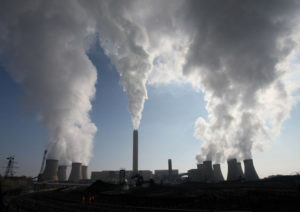
British-Based Drax Company Signs Settlement over Pollution Violations at its Morehouse and LaSalle BioEnergy Plants
BATON ROUGE, LA. – In response to air pollution violations at a pair of wood pellet manufacturing plants in Louisiana, the U.K. based power company Drax has agreed to pay $3.2 million in penalties to the state and install emissions control equipment.
A pair of settlement agreements signed by the Louisiana Department of Environmental Quality and Drax for the company’s plants in Morehouse and LaSalle parishes were sent to the Louisiana Attorney General’s office and are now awaiting approval by the Attorney General.
Drax’s Morehouse BioEnergy and LaSalle BioEnergy plants pulverize trees into pellet fuel to be burned in Drax’s U.K. power plant, which receives subsidies for burning a wood-based fuel instead of coal, based on questionable claims that this is better for the climate.
“While these fines may not hurt Drax’s bottom line, and the facilities continue to pollute, the sums represent some of the largest settlements levied by Louisiana against environmental violators in the state in decades,” said Patrick Anderson, an attorney with the Environmental Integrity Project. “Drax and others continue to paint the wood biomass industry energy as ‘green,’ but the magnitude of these penalties show that the industry poses serious risks to communities across the southeastern U.S.”
Anne Rolfes, Director of the Louisiana Bucket Brigade, an environmental advocacy group, said: “The only reason there are fines being issued is because we pushed the Louisiana Department of Environmental Quality (LDEQ) to take action. On its own, the LDEQ lets polluters have free reign.”
Between 2017 and 2019, the Environmental Integrity Project (EIP) worked with the Sierra Club, the Louisiana Environmental Action Network, and the Louisiana Bucket Brigade, among others, to investigate and document the fact that the Drax plants were emitting hundreds of tons of illegal volatile organic compounds (VOCs) per year, in violation of their Clean Air Act permits.
VOCs are a family of chemicals that cause ground level ozone, or smog. Breathing smog is harmful to anyone, but especially the elderly, young children, and those with lung conditions such as asthma. VOCs emitted by wood pellet plants also contain numerous chemicals that are hazardous even in very small amounts because they are toxic and/or carcinogenic.
EIP submitted written documentation of the VOC air pollution problem to LDEQ and petitioned EPA to end the illegal pollution. EIP also documented similar VOC emissions from another Drax wood pellet plant in neighboring Gloster, Mississippi, and complained about it to Mississippi’s Department of Environmental Quality.
Although Drax initially denied the accusations, and even submitted test results in Mississippi that later proved false, the state agencies eventually agreed with EIP. Reliable testing later showed the wood pellet plants vastly exceeded the emission limits in their air pollution control permits. For example, the Morehouse plant in Louisiana was permitted to emit less than 250 tons of VOCs but actually emitted more than 1,100 tons per year. The violations happened every year since the plants were built between 2012 and 2015.
Now, LDEQ and Drax have signed settlement agreements to resolve these violations. The agreements would impose $1.6 million penalties on each of the two Louisiana facilities, which would be largest such settlements Louisiana has imposed in nearly a decade.
Mississippi, meanwhile, fined Drax $2.5 million for its violations in that state in 2020. If the LDEQ settlements are finalized, as expected, Drax’s violations at three manufacturing plants will cost the company nearly $6 million. All three facilities were also subsequently required to install new air pollution control technology in order to reduce VOC emissions.
For a copy of the settlement agreements, click here (for Morehouse) or here (for LaSalle.)
Drax, meanwhile, is the largest consumer of wood pellets in the world. Drax burns the pellets as fuel in the company’s enormous U.K. power plant. The facility, in North Yorkshire, England, is the U.K.’s largest emitter of greenhouse gases. Drax receives hundreds of millions of dollars in subsidies each year to burn wood in a misguided bid to reduce carbon emissions. Most climate scientists agree that burning wood harvested from trees in the southeastern U.S. is worsening rather than mitigating climate change.
The Environmental Integrity Project is a 20-year-old nonprofit, nonpartisan organization, based in Washington, D.C., and Austin, TX, that is dedicated to enforcing environmental laws and strengthening policy to protect public health and the environment.
Media contact: Tom Pelton, Environmental Integrity Project (443) 510-2574


